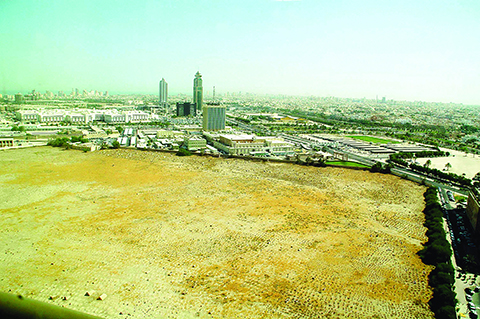 KUWAIT: The Municipality is planning to convert old cemeteries into public parks, but there have been some protests over such moves. The Municipal Council is in charge of allocating properties to various public institutions and is in charge of cemeteries as well. Kuwait Times spoke to the Director of the Municipal Council Muhalhal Al-Khaled to learn more about this issue and others.
KUWAIT: The Municipality is planning to convert old cemeteries into public parks, but there have been some protests over such moves. The Municipal Council is in charge of allocating properties to various public institutions and is in charge of cemeteries as well. Kuwait Times spoke to the Director of the Municipal Council Muhalhal Al-Khaled to learn more about this issue and others.
"There is a rule that after 50 years of disuse, a cemetery goes out of service and can be changed into a park. An example is the Baladiya Park, which was originally a graveyard. Later, a fatwa was issued forbidding this change, and ideas were proposed to build multi-storey car parks on cemetery grounds. Many conflicts ensued, so the municipality preferred not to execute these projects and avoid problems. So we only planted flowers on top of the gravesites," said Khaled.
There are 50 cemeteries in Kuwait including one on Failaka Island, but only cemeteries in three areas are in use. "One cemetery is in Jahra, three in Sulaibikhat for Sunnis, Shiites and non-Muslims, and one in Subhan. All other cemeteries are abandoned and not used anymore," he said. The current cemeteries have enough space to operate for the next 10 years and more. "Although we don't have a shortage presently, there are expansion works in progress at the Sulaibikhat cemetery.
The cemetery will expand from the boundary wall to Jahra Road and the mosque there will be shifted to the residential area in Nahda," Khaled added. The bodies of about 80 percent of non-Muslims who die in Kuwait are repatriated. "We don't have many non-Muslims buried here as mostly their families choose to send their bodies back home. But the new expansion of the Sulaibikhat cemetery will include the non-Muslim cemetery," noted Khaled.
Other Projects
The Municipal Council is working on many other projects that will be executed in the future. "We have a project plan that hasn't been approved yet by the Amiri Diwan. After it's signed, we will announce it. This plan includes developing and connecting the northern islands with a bridge and building various vital projects there," Khaled explained. More projects will be executed soon.
"The zoo will be transferred to Mutlaa from its present location in Omariya. It will be much bigger there. I don't think that the distance will stop people from visiting it, as today the roads are modern and a long drive is part of a picnic far away from the city. Also, Mutlaa will be a residential city and to have the zoo there is better than in a crowded area," he pointed out.
The Public Authority for Agricultural Affairs and Fish Resources has also demanded receiving control of 18 public parks in various areas to change them into indoor parks. "The co-ops in these areas will be responsible for establishing health clubs in these parks with nominal entrance fees. These parks or locations were in bad condition and almost abandoned," stressed Khaled.
"We are also completing housing units. The houses are divided in various areas including 55,000 houses in Subbiya, 25,000 in Mutlaa, 53,000 in Nawaf City, 43,000 in South Saad Al-Abdullah and 25,000 in South Sabah Al-Ahmad City. The parliament has decided to distribute 12,000 houses every year, while in the past it was only about 350 annually.
This should end the housing problem as there are about 106,000 applicants waiting," he stated. The Municipal Council will also revamp the ageing Entertainment City. "The enlargement will be of more than one kilometer, and will be executed by an international company. The executive director of this company has many innovative ideas to develop this city and this is in the interests of the public," Khaled concluded.
By Nawara Fattahova, Staff Writer










